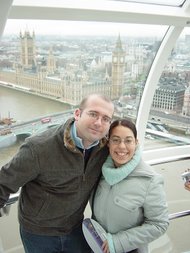The text below was written by Jesmond Saliba, who was the political editor of a Maltese broadcaster for six years and who has spent the past six years as the communications coordinator to a member of the Maltese cabinet. He is currently also reading for an MSc in Corporate Communications and Public Affairs and describes himself as and an avid user and believer in IT.
I asked him for his thoughts on how current developments in political communications which are taking place in the UK - and which follow on from developments in the States - might affect the way in which the Maltese governement and Maltese politcians communicate with the public in the near future. These are his thoughts
'The country has witnessed an interesting and overwhelmingly increase in the take up of ICT. This was the result of various efforts which were taken by the Maltese Government in rolling out eGovernment services and also by taking direct initiatives in the fight against digital divide. However, despite this take up I believe that the role of IT in local (national) politics communication strategy and action plans is still not as relevant as let's say the US.
The major political parties have a website and a news portal. Yet given the importance both give to other media, they both have their own newspapers, radio stations and tv stations. While the latter three media are mainly focused in delivering messages to the grassroots, the new media can be accessed by the grassroots, new voters and the 20% who normally tend to influence voters.
The influence of new media on voting paterns is still to be tested an analysed however I don't think that to date the influence was significant, as such importance is not high. If it has to be effective new media tools have to be one of several media through which news is managed by the politicians.
From a government point of view, I think that new media (and not necessarily blogging) has opened a new access to politicians. Today it is easy to communicate with a Minister via an email.
Emails tend to increase accountability as track of what is written and said is easily accessed and kept. In the coming 18 months, most probably we'll witness the popping up of several websites promoting the various candidates who'll be contesting the General Election. All will probably include an email-the-person section. I think that for the forseeable future, this will be the utilisation of new ways of communications as all politicians will dedicate more time to visit personally their constitutents.
Malta's size facilitates the task to visit every constituent if possible. This is still valued as the most important tool to persuade voters. This is still the most favourite way how constituents want to meet their candidates. The personal touch is still given the importance. I still believe that this is the key for successful election bids.
I believe that if political parties take the bold step to move out from the local media scene and free the airwaves from their presence, then there will be more room for development for the role of new media in the political field. Until then politicians still prefer to blog their views on the traditional media via sound-clips and talking points rather then on the net. I think that the majority of the constituents still prefer their politicians to ride the (media) wave then having to surf the net to see what they're after.'
Sunday, 7 January 2007
Subscribe to:
Post Comments (Atom)

No comments:
Post a Comment